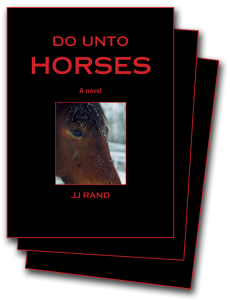
“Do Unto Horses” is a novel with a social conscience. It is about a horsewoman who has everything an equestrian should want in life, yet she feels uneasy due to the way she sees some owners treat their horses. She tries to right some of the wrongs, though not necessarily in the most useful way and without her husband’s knowledge. The book combines a little mystery, romance, murder and a horse shooting with timeless ethical questions about horse ownership and veterinary care. Author JJ Rand is a lifetime horse owner and has been taking notes for years on topics that would make good books. “Do Unto Horses” is available in print and Kindle form on
Amazon.
Older posts
A resident of New Lambton in New South Wales, Australia, wrote a letter to the editor of the “Newcastle Herald” on June 9, 2013, decrying a planned horse cull by park officials in Kosciuszko National Park, southwest of Sydney. The National Parks Association of NSW (NPA) is calling for professional hunters to kill feral horses, or brumbies, in the park by helicopter.
An unflattering review of the Bureau of Land Management’s removal of wild horses from public land was released on June 5, 2013. It raises troubling questions about who has been running this agency.
A column on the website of the “Farmington Daily Times,” a website based in New Mexico, where a horse slaughter plant is poised to open, recently analyzed some of the arguments made by opponents to horse slaughter.
I try to look at situations from both sides and consider the motives behind activities that I don’t understand or like. Maybe there’s a family history behind someone being a hunter. Maybe there’s a hormonal component or stress behind someone lashing out at a horse in a moment of anger. But I am at a complete loss for what is going through the minds of people who enjoy horse tripping.
I believe we should treat horses as we expect to be treated ourselves: with respect and dignity. Treating horses abusively should carry the same punishment as it would in the human world.
The “Albuquerque Journal” recently toured the horse slaughterhouse in New Mexico that is awaiting a USDA permit to open. The reporter provided all the gory details in a story published May 9, 2013. I’m not even going to link to the story. The process is as bad as I suspected. And it wouldn’t need to be nearly that bad for me to consider it inhumane.
Do horses share their rider’s enjoyment of sporting and recreational activities? It’s a question that was asked in February 2013 by Dr. Bidda Jones, chief scientist at the Royal Society for the Prevention of Cruelty to Animals in Australia.
The Associated Press reported in March 2013 that a meat company employee in New Mexico had videotaped himself shooting a horse in the head as he swore at animal activists who were harassing him at his job.
The Obama administration’s 2014 budget includes a proposal that would prevent money from being spent on the inspection of horse slaughtering facilities. In effect, this would ban the slaughter of horses for human consumption because facilities cannot operate without inspections. Needless to say, this was greeted with mixed enthusiasm.
The American Horse Council runs a program called Congressional Cavalry that sends emails on horse-related congressional action to people who want this information.
The Unwanted Horse Coalition, now a part of the American Horse Council, maintains a list of facilities that will take needy horses. The rescues are listed by state.
Putting down a horse has to be one of the most difficult and expensive parts of owning a horse. Which is why a recent story out of Iowa is infuriating.
Federal and state officials dealt horse slaughter plants a one-two punch on Jan. 17, 2014, perhaps ending the latest move to butcher American horses for foreign consumption.
Horses unfortunate enough to have owners with empty pockets are seeing an alarming increase in abuse.
Shelbyville corporate attorney and horse owner Frank Eichler made an interesting statement in an article published in The Tennessean on Nov. 29, 2013, on the soring of Tennessee Walking Horses.
Brain scans of animals indicate they have emotions similar to those of people; this may help raise the status of animals in courts.
It’s unclear as I watch Andras Forgacs’ September 2013 presentation on the website of TED, a nonprofit devoted to spreading big ideas.
As the fight over horse slaughter continues in the courts, I can’t help but wonder what slaughter plant owners are thinking.
To those who think they can do whatever they want with a horse with no consequences, I would say: “Find a new sport. Your days in this one are over.”
